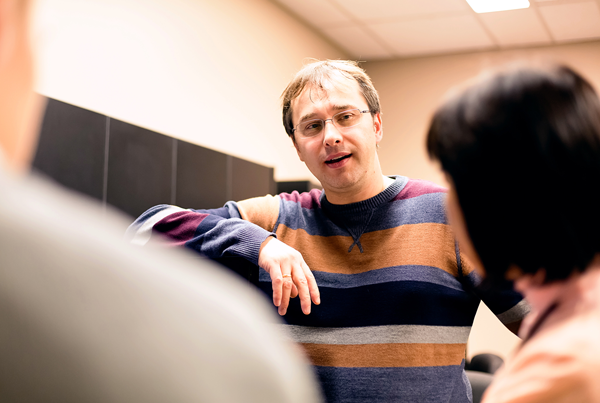Imagine a person with advancing, and ultimately life-limiting, chronic illness who is living at home with a family caregiver. Now imagine this person is able to complete an at-home, electronic quality of life assessment of person-centred outcomes, including how they are faring in the areas which they have identified as important, perhaps physical health, symptoms, or psychological wellbeing. The patient then meets with their health care provider and, together, they consider the results of this person-centred outcomes assessment along with clinical assessments and tests and determine the goals of care and appropriate interventions.
This is the vision of Dr. Rick Sawatzky’s project as the renewed Canada Research Chair in Person-Centered Outcomes.
“This is a completely different way of doing health care,” said Dr. Sawatzky, “It’s about changing the information being considered in ensuring the care provided addresses what matters most to the patient.”
According to Dr. Sawatzky, we are currently reliant on a health care professional’s ability to ask the right questions and a patient’s ability to articulate how they are feeling or functioning, all in very short, infrequent time windows.
Dr. Sawatzky’s project, supported by the Canadian Foundation for Innovation (CFI), will focus on embedding person-centered technologies into an existing health information system. The existing system, developed by Cambian, is a person-centered health care technology that allows individuals to manage their personal health record and decide who has access to that information and what their data may be used for. Information shared by patients with their healthcare providers is a common starting point and language for their discussions.

Dr. Sawatzky’s addition to this technology will be the implementation of a novel tailored computerized adaptive testing (CAT) module. Unlike traditional assessments which require that a person answer all questions on a questionnaire, CAT uses the person’s answers to previous questions to administer only those upcoming questions that will be most informative. This dynamic process makes CAT a valuable tool for increasing efficiency in measuring person-centred outcomes. However, conventional CAT only uses information from the questions themselves to select more questions. It does not take a person’s unique circumstances into account.
“In the real world, populations are diverse and there are a mix of factors that affect a person’s response to any question, like demographics, diagnoses and clinical differences, and psycho-social factors,” said Dr. Sawatzky, “These factors need to be taken into account when designing tools for person-centred outcomes assessment.”
This novel approach, known as mixture CAT (mCAT), aims to incorporate these factors into the adaptive testing process, and has been one of the key pieces of Dr. Sawatzky’s body of work, which involves the use of statistical methods to increase accuracy and appropriateness in measuring person-centered outcomes.
“What we’re trying to do with this current work is to facilitate the encounter between a patient and their health care provider, improve the efficiency and accuracy of person-centered outcome measurement, and make sure we are measuring what matters to each person” said Dr. Sawatzky.
Ultimately, electronically embedding this type of approach within clinical decision-making processes will bring the needs, priorities, and concerns of patients to the forefront and ensure that they are considered in the decision making process.
“The technology we are developing is unique — no health information system currently in use incorporates mCAT,” he said. But, Dr. Sawatzky noted, it will take more than validated methodology to truly make person-centered care a universal reality.
“What we really need is change in the culture of care,” he said, “We need to look at whose perspectives drive the decision making process and the information that is being considered in those decisions.”
One way to initiate this type of culture change is through small-scale projects that are then scaled up. At St. Paul’s, this type of approach has been implemented in several specialty areas, including palliative care and the hemophilia program. Dr. Sawatzky recently teamed up with CHÉOS Scientist Dr. Sandra Lauck to bring person-centred outcomes to the Heart Centre.
“It’s vital that health care providers buy in to this type of approach,” he stressed, “The services that are provided to patients do not define what health care is, it’s about the person.”
Dr. Sawatzky’s renewed Research Chair appointment is supported by matched funding from the CFI and Cambian, funds from the Arthur Child Foundation, and a sizeable private donation. For more information about the CRC, see the Trinity Western University website.



